
COVID-19 STRESS FALLS AMONG GRANITE STATERS BUT PANDEMIC WEIGHS HEAVILY ON MENTAL HEALTH OF YOUNG PEOPLE
Prepared by:
| University of New Hampshire | Dartmouth College |
| Sean P. McKinley, M.A. | Judy Rees, B.M., B.Ch, M.P.H., Ph.D. |
| Tracy Keirns, Ph.D. | Leila Mott, M.S. |
| Zachary S. Azem, M.A. | Janet Peacock, Ph.D. |
| Andrew E. Smith, Ph.D. | Rebecca Lebeaux, B.S. |
| Yuka Moroishi, B.S. | |
| Quang P. Nguyen, B.S. | |
| Philip J. Schuld, B.S. |
DURHAM, NH - Stress among New Hampshire Residents related to the COVID-19 pandemic has declined compared to early April. Few Granite Staters report feeling considerable stress over their personal health or access to food or supplies, but many express significant concern for the family's health and emotional well-being. Those under the age of thirty are most likely to report experiencing these feelings and report higher levels of overall stress. Despite the pandemic, most residents report exercising and spending time outdoors at least three days a week. Those who do these things five or more days a week report lower overall stress than others.
These findings are based on the Dartmouth College - UNH Survey Center New Hampshire COVID-19 Study*, conducted by the University of New Hampshire Survey center in collaboration with the Department of Epidemiology at the Geisel School of Medicine at Dartmouth. In the most recent iteration of the survey, eight hundred thirty (830) Granite State Panel members who had completed the baseline survey in early April completed a survey online between May 1 and May 5, 2020. Data were weighted by respondent sex, age, education, and region of the state to targets from the most recent American Community Survey (ACS) conducted by the U.S. Census Bureau, as well as party registration levels provided by the New Hampshire Secretary of State. The Granite State Panel is part of an effort by the University of New Hampshire Survey Center to investigate new ways of gathering and understanding the opinion of New Hampshire residents. Granite State Panel members are recruited from randomly-selected landline and cell phone numbers across New Hampshire and surveys are sent periodically to panel members.
Overall Stress as a Result of COVID-19
Overall stress among New Hampshire residents as a result of the COVID-19 pandemic has declined since early April. When asked to place themselves on a 0-10 scale denoting their overall level of stress as a result of COVID-19, 19% place themselves at 8, 9, or 10, whereas 39% of respondents did so in early April. Thirty-one percent of respondents currently place themselves at 6 or 7 on a 0-10 scale, 32% place themselves at 3, 4, or 5, and 18% place themselves at 0, 1, or 2, up slightly from 13% who placed themselves there in early April. The mean response has fallen from 6.4 in early April to 5.2 in early May.
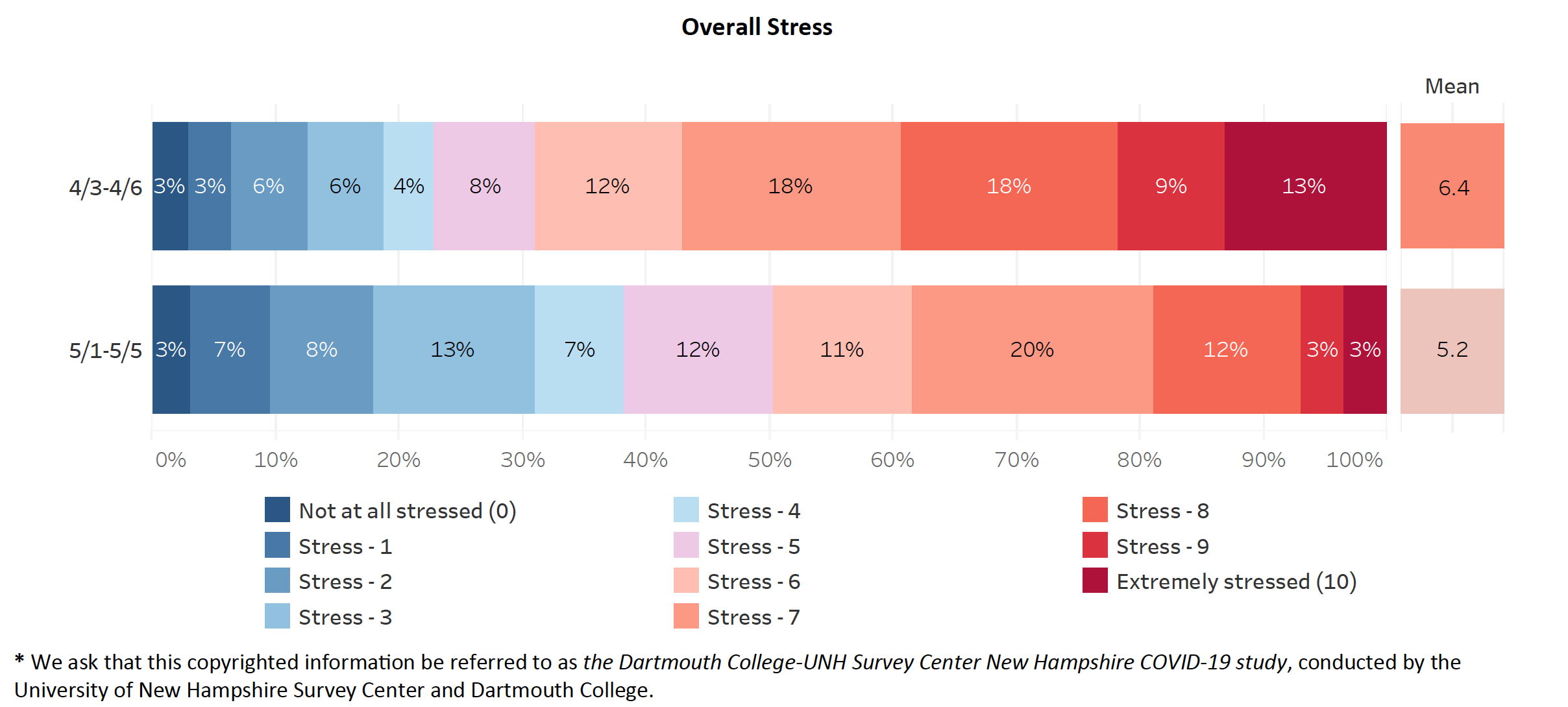
While differences in overall stress remain among demographic groups, all of the following groups reporting feeling lower levels of stress now than in early April. Women continue to be slightly more stressed than men, while registered Democrats and those registered as undeclared or not registered are slightly more stressed than registered Republicans. Overall stress appears to be inversely correlated with one's age.

More than half of Granite Staters say that they are extremely or somewhat stressed about their family's health (57%), their family's emotional well-being (56%), their friends and community (56%), and their child's education (55%). Less than half of New Hampshire residents are extremely or somewhat stressed about taking care of their children at home (42%), an increased workload or more stress at work (42%), the loss or potential loss of their job or employment hours (42%), their family's finances (41%), their health (37%), or access to food supplies (28%).
While significant numbers of state residents continue to feel stress in these areas, the percentage who say they are extremely or somewhat stressed has declined by double-digits for each area since early April, with the largest declines in stress concerning the respondents' own health, their family's health, and their family's finances.
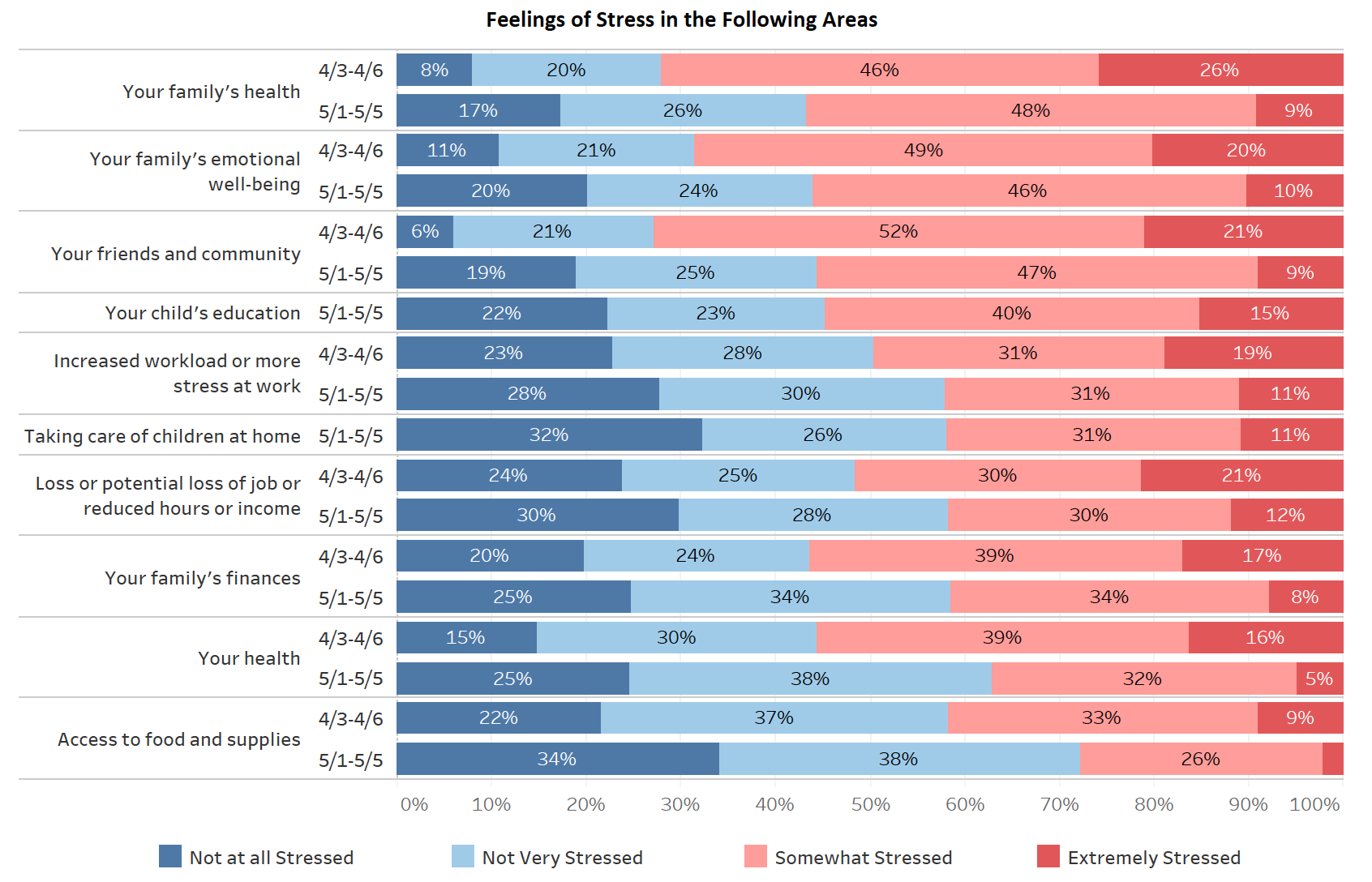
- Respondents with a college degree, women, and registered Democrats are more likely than those without a college degree, men, and registered Republicans to be extremely or somewhat stressed about their family's health.
- Despite COVID-19 disproportionately affecting older people, there are no clear differences in levels by age in levels of stress concerning one's own health. Women and registered Democrats are more likely than men and registered Republicans to be stressed about this.
- Men and women with children are about equally stressed about their child's education, but men are more likely than women to be stressed about taking care of children at home.
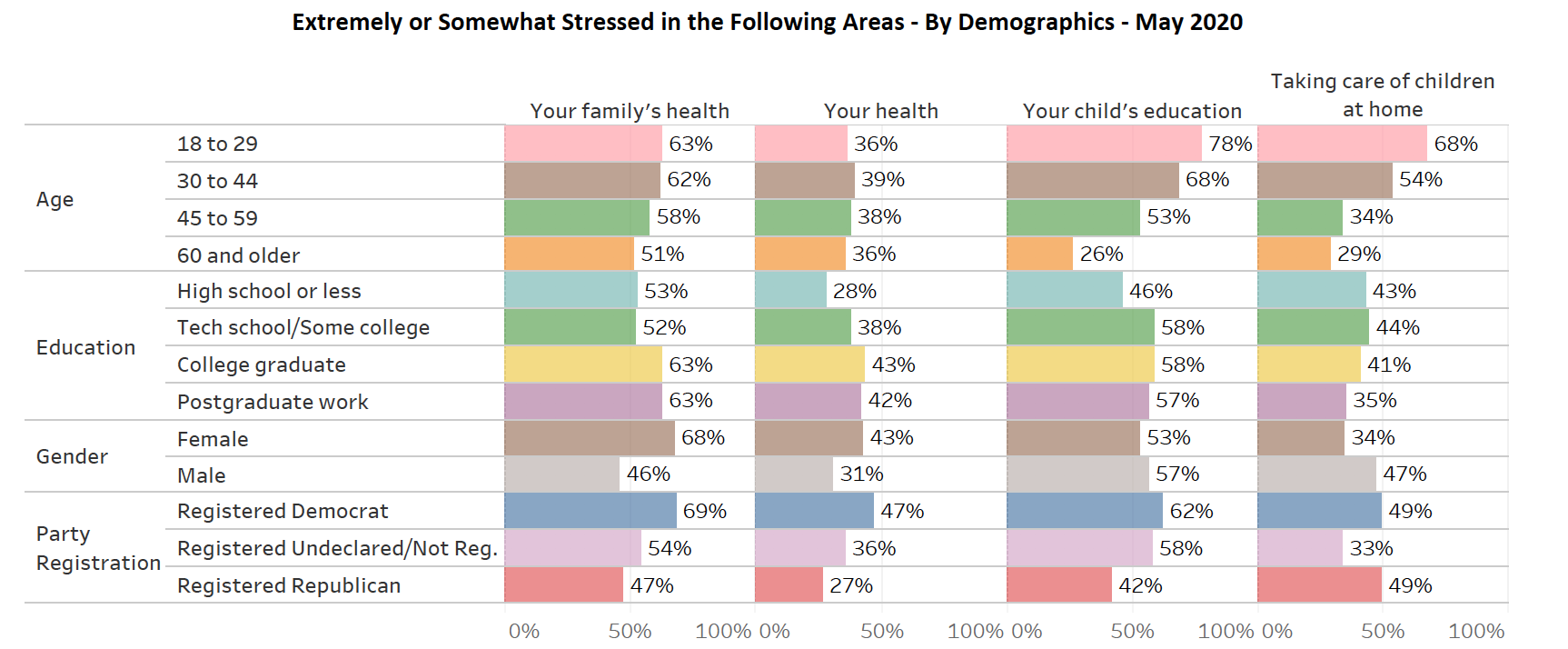
Quality of Life
Most New Hampshire residents (62%) report having trouble falling asleep or staying asleep for at least one of the previous seven days, with 22% saying this happened to them four or more days. Despite lower levels of reported stress, the number experiencing trouble falling asleep or staying asleep is largely unchanged since early April.
Women, registered Democrats, and those under 30 are more likely than men, registered Republicans, and those aged 60 and older to report having had trouble falling asleep or staying asleep for at least one of the previous seven days.

Those who frequently have trouble falling asleep or staying asleep also report higher levels of overall stress. Stress among those who report this happening to them five or more of the previous seven days is considerably higher than average, while those who say this happened to them only once or not at all in the previous seven days are experiencing a level of stress well below average.

Despite the pandemic, most New Hampshire residents have participated in physical exercise of 20 minutes or more multiple times in the previous seven days. Thirty-eight percent report having participated in physical exercise on five or more of the previous seven days, 28% have done so three or four days, 16% have done so one or two days, and 17% have not participated in any physical exercise over that time. Respondents report spending twenty minutes or more doing outdoor pleasure activities in similar numbers: 29% did so on five or more days of the previous seven, 29% did so three or four days, 27% did so one or two days, and 14% have not done so.
Granite Staters appear to be participating in these activities slightly more frequently than they reported in early April: two-thirds (66%) participated in physical exercise three or more of the previous seven days in early May compared to 62% in early April, while 58% spent twenty minutes or more doing outdoor pleasure activities on three or more days compared to 48% in early April.
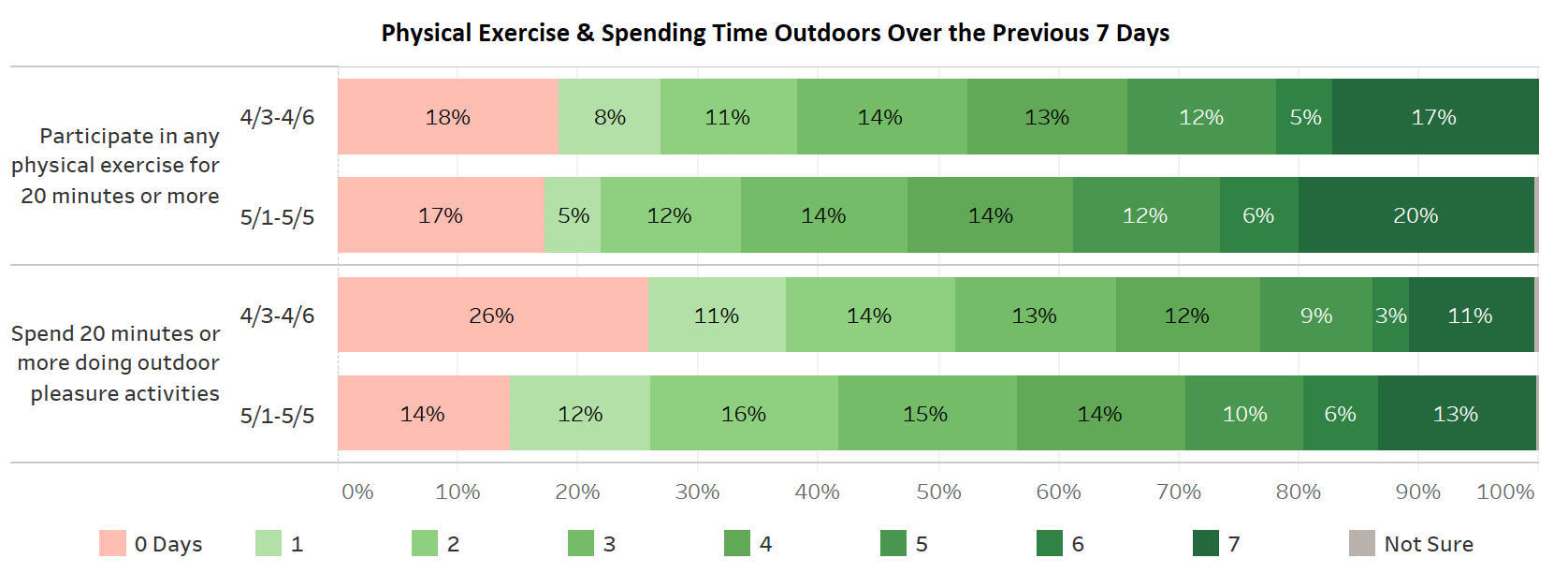
Those who report participating in physical exercise for twenty minutes or more on five or more of the previous seven days report lower than average stress. Those who spent twenty minutes or more doing outdoor pleasure activities five or more of the previous seven days report lower than average stress while those who spent no days doing outdoor pleasure activities are reporting higher levels of stress.

Those who have recently worked as a frontline worker in frequent contact with others (e.g. grocery store, pharmacy, bank, etc.), those who have worked in a healthcare setting, and particularly those who have worked as a first responder are experiencing slightly higher stress than average.

Pre-Existing Conditions
Just over half (53%) report having a pre-existing condition of some kind, but these individuals are experiencing only very slightly more stress than those without a pre-existing condition. Those with an anxiety or mood disorder or asthma are a good deal more stressed than others while those with diabetes, COPD or chronic lung disease, or heart disease are less stressed than average.

Mental Health
Using a short standardized questionnaire designed to quickly screen for generalized anxiety and depressed mood*, 15% of New Hampshire residents meet the threshold for identifying possible cases of generalized anxiety disorder and 17% meet the threshold for depression.
For comparison, national past-year prevalence estimates for generalized anxiety and depression are 3% and 7% respectively**. Using this scale, the current prevalence of anxiety among New Hampshire residents is approximately five times as high than would be typical while the prevalence of depression is more than twice as high as it is under normal circumstances.
- Younger residents are considerably more likely than their older counterparts to be experiencing anxiety and depression: residents under the age of 30 are four times as likely as those 60 and older to be experiencing anxiety and are six times as likely as those 60 and older to be experiencing depression. This pattern matches that of national estimates.
- Women are more than twice as likely as men to be experiencing generalized anxiety and nearly twice as likely to be experiencing depression. This pattern matches that of national estimates.
- Those who have lost their job or had their hours at work reduced are slightly more likely than those who have not lost a job or work hours to be experiencing generalized anxiety or depression.
- Registered Democrats are more than three times as likely as Republicans to be experiencing generalized anxiety and about one and a half times more likely to be experiencing depression.
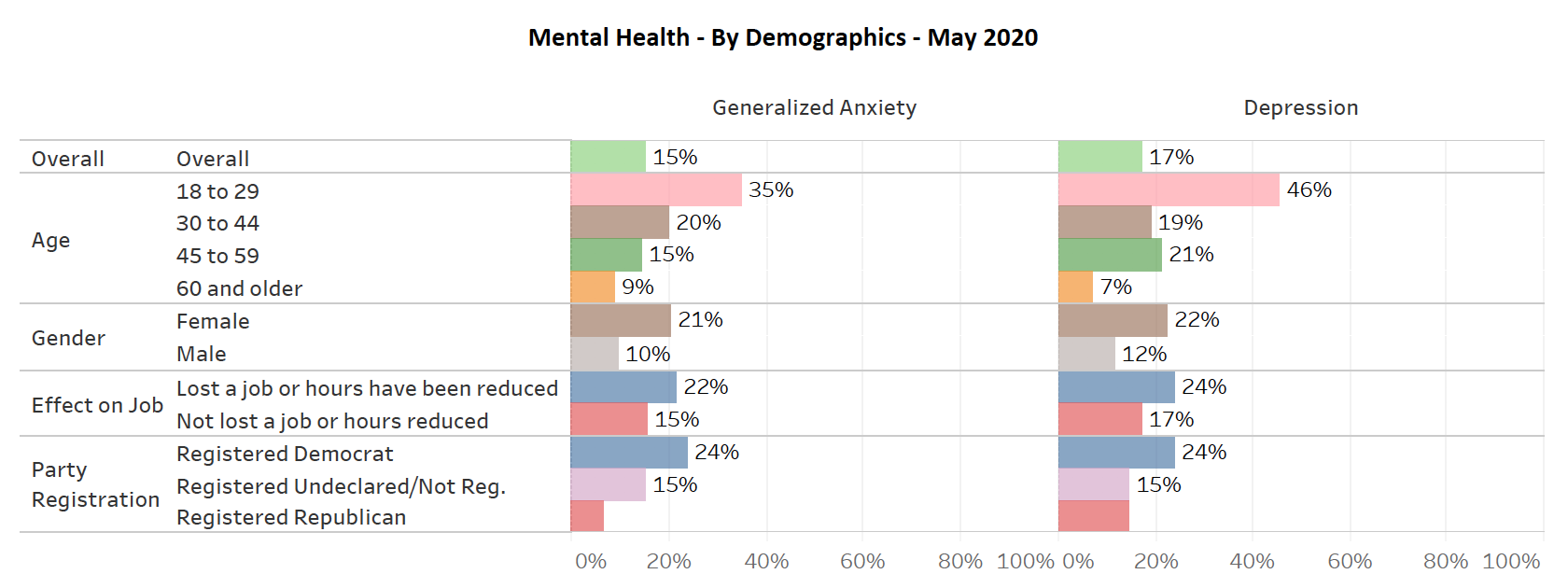
*Kroenke K, Spitzer RL, Williams JB. The Patient Health Questionnaire - 2: Validity of a Two-Item Depression Screener. Medical Care. 2003;41:1284-92.
**https://www.nimh.nih.gov/health/statistics/index.shtml
Dartmouth College-UNH Survey Center New Hampshire COVID-19 Study Methodology
These findings are based on the Dartmouth College-UNH Survey Center New Hampshire COVID-19 Study, conducted by the University of New Hampshire Survey Center in collaboration with the Department of Epidemiology at the Geisel School of Medicine at Dartmouth. One thousand and twenty-nine (1,029) Granite State Panel members completed an initial survey online between April 3 and April 5, 2020. Data were weighted by respondent sex, age, education, and region of the state to targets from the most recent American Community Survey (ACS) conducted by the U.S. Census Bureau, as well as party registration levels provided by the New Hampshire Secretary of State. The Granite State Panel is part of an effort by the University of New Hampshire Survey Center to investigate new ways of gathering and understanding the opinion of New Hampshire residents.
Granite State Panel members are recruited from randomly-selected landline and cell phone numbers across New Hampshire. Respondents to the Granite State Poll were asked if they wished to participate in further research and asked to provide an email address. Those who agreed and provided an email address were added to the panel. Panel members were also recruited by texting a random sample of cellular telephones in the state and inviting the recipient to take a short survey.
For each survey which they complete, panel members are entered into quarterly drawings to earn rewards, such as gift certificates from statewide and internet companies. Due to rounding, percentages may not sum to 100%.
For more information about the Dartmouth College-UNH Survey Center New Hampshire COVID-19 study, please visit:
https://cola.unh.edu/unh-survey-center/projects/dartmouthunh-covid-19-survey
For more information about the Granite State Panel, please contact Dr. Andrew Smith at (603) 862-2226 or by email at andrew.smith@unh.edu or visit:
https://cola.unh.edu/unh-survey-center/projects/granite-state-panel
This project is supported by emergency funding from The Hitchcock Foundation, the Jack and Dorothy Byrne Foundation, Dartmouth College COVID-19 "Spark" funding, and in-kind support by UNH Survey Center staff.